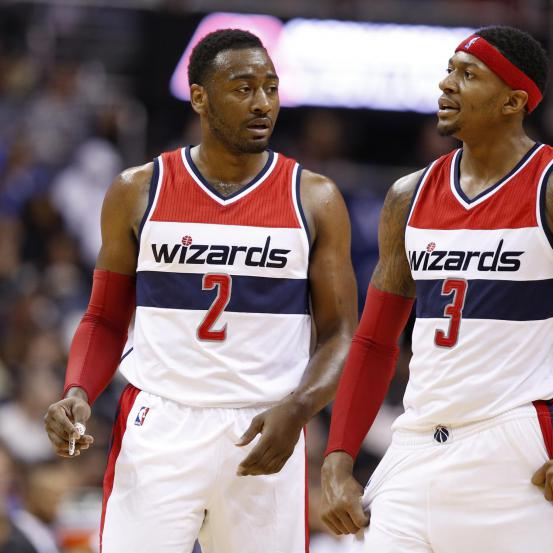- Commissioner’s statement on Ventura, Marte
- Ronnie O’Sullivan: Masters champion ‘felt so vulnerable’ in final
- Arron Fletcher Wins 2017 WSOP International Circuit Marrakech Main Event ($140,224)
- Smith challenges Warner to go big in India
- Moncada No. 1 on MLB Pipeline’s Top 10 2B Prospects list
- Braves land 2 on MLB Pipeline’s Top 10 2B Prospects list
- Kingery makes MLB Pipeline’s Top 10 2B Prospects list
- New Zealand wrap up 2-0 after Bangladesh implosion
- Mathews, Pradeep, Gunathilaka to return to Sri Lanka
- Elliott hopes for rain for Poli
Top 2016 Offseason Priorities for the Washington Wizards
- Updated: April 24, 2016

After failing to thrive in the improved Eastern Conference, the Washington Wizards missed out on the postseason, concluding with a mediocre 41-41 record.
Sweeping the Toronto Raptors during last year’s playoffs, then winning two games against the Atlanta Hawks in the conference semi-finals, made the future seem bright.
The plan was clear: Build on a successful 2014-15 campaign, continue to threaten in the playoffs and ultimately showcase enough to entice Kevin Durant this summer. That scenario seems even more far-fetched than it was a year ago, and it puts Washington in a pickle.
Injuries ravaged the roster, even though John Wall single-handedly kept the team afloat with excellent individual play. The front office now owes it to its star to put a competitive roster around him, and it must navigate through a lot of difficult offseason decisions to get there.
Already Complete: Hire a Head Coach
Randy Wittman’s reign ran its course, as Washington opted to part ways with its former head coach. An efficient dog sled requires a competent musher, especially one that sees eye-to-eye with the lead dog, and he simply wasn’t getting the job done anymore.
It’s a vacancy the front office filled quickly, signing Scott Brooks to a five-year, $35 million deal, according to Adrian Wojnarowski of The Vertical.
Brooks has his flaws. His tactical acumen, or lack thereof, was frequently criticized by the media, and he was never great at making in-game adjustments. He relied on his superstars to carry a simplistic, isolation-heavy offense, which arguably limited the team’s potential.
But he also accomplished a lot of positive things.
He managed to get plenty of postseason experience under his belt while in charge of the Oklahoma City Thunder. He was well-liked by his players, and the calm demeanour played a big part in Russell Westbrook’s and Kevin Durant’s development. He should be able to establish a great relationship with Washington’s core players, and emotional leadership shouldn’t be brushed away.
Brooks was likely the best choice with Tom Thibodeau off the market (to the Minnesota Timberwolves), and the Wizards’ urgency to secure his signature was encouraging.
Establish an Identity
The 2014-15 Wizards were an elite defensive team, an identity which was absent this year. Washington made an attempt to follow in the league’s small-ball footsteps, actively downsizing its lineups to bolster a stagnant offense.
Even though the Wizards managed to bump up their offensive rating by 1.1, they ranked 19th in the category for a second straight year, according to ESPN’s Hollinger stats. Jorge Castillo of the Washington Post detailed the failed experiment:
The pace-and-space offense led by Wall generates more scoring opportunities but also more turnovers, failing to offset the drop-off on defense. The Wizards’ deviation from two traditional big men has not had the intended effect of better countering the perimeter-oriented strategy most of the league adopted before them.
This phenomenon isn’t entirely uncommon—teams frequently try to adopt popular …
continue reading in source www.bleacherreport.com
